Féminas is the Congress of Gastronomy, Women and Rural Milieu organised by Vocento Gastronomía and promoted – by the Principality of Asturias - “to showcase and support women connected with the world of cuisine, the rural milieu and actively working to promote sustainable practices”. The second edition took place in mid-May in Cangas del Narcea, in the south-west of Asturias, inside the fascinating Parador de Corias, an ancient monastery perched among forests and mountains. The three days of meetings, cooking demos, debates, and talks had prominent chefs like Manu Buffara, Fatmata Binta, Cristina Bowerman, Najat Kaanache, Elena Arzak talk... All Feminas.
First question: is it really necessary to organise an event dedicated to the role of women in gastronomy? Aren’t the barriers broken? I had well in mind the words of Massimo Bottura who, during the latest Identità Milano congress at the end of April, with his usual extrovert and fun attitude during an unplanned moment while Cristina Ziliani of Cantine Berlucchi was giving Jessica Rosval the Premio Identità Donna exclaimed: «Enough with this story! We don’t care if it’s a man or a woman. What’s important is that they are talented». Cheers from the audience.
But back to Féminas. Actually, no. There’s another image first. During the event in the Asturias, they announced the World's Best Female Chef according to the 50Best, Colombian Leo Espinosa. So once again: do we need to give similar awards? Of course, we only have three women in the 50 Best, to which we must add 4 more if we widen the horizon to the 100 Best. But the same happens in the Oscars: though nobody will ever think to create an award for the best Female Director...
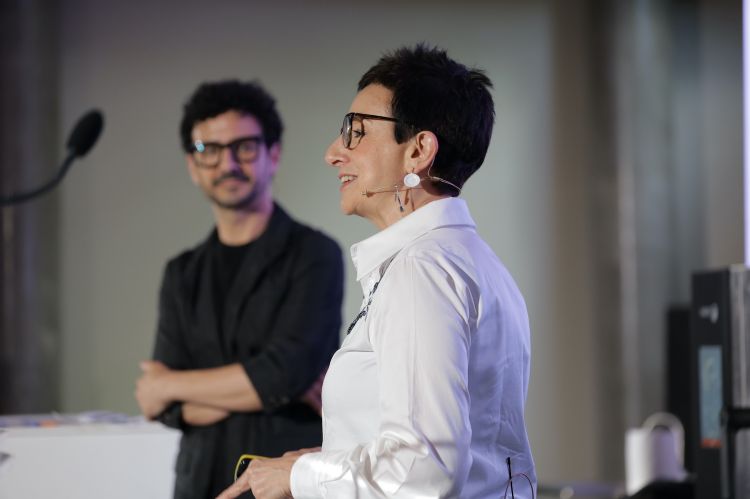
Carme Ruscalleda and her son Raül Balam on the stage of Féminas. The two presented their new restaurant, Cuina Sant Pau, in the location that used to hold the glory of three-starred Sant Pau, closed in 2018. Cuina (kitchen) because «it’s the only space of the restaurant that remained exactly the same - Raül exclaimed. - Same philosophy as Sant Pau, but a completely different concept: an informal and laidback meal, imagined for clients who want to share a nice dish»
This debate was present throughout the three days of
Féminas. While it is true, and it’s obvious, that it would be pointless to have women and men compete in the same marathon, given congenital differences in strength, «in the kitchen we have our brigade behind us, to support us, and we can compete in the same conditions as men», multi-starred Spanish chef
Carme Ruscalleda exclaimed. She got on stage with her son
Raül Balam.
Ruscalleda was the first female Spanish chef to get the third Michelin star, in 2006, with her restaurant
Sant Pau in Catalonia, and she has had seven at the same time (she now has four: two for
Moments - Mandarin Oriental in Barcelona and two for
Sant Pau in Tokyo). In 2014 she did not accept the
Best Female Chef in the world award, in its first edition, saying that «I’m not interested in breadcrumbs. I do the same job as a man». At the time, when explaining her choice she added: «What will be the next step? The best chef of colour?».
Of course, something is changing for the better. Even Ruscalleda admitted it: «When I was born, as women we had to put on a metaphorical backpack». Inside, there were «the obligation to look after your house, your husband, your children. And to cook for the family. Today luckily we live a moment in which we are often at work in professional kitchens while men are cooking at home». Carme pointed out the importance of a congress like Féminas «to discuss, showcase, reflect» and, with her son Raül, she talked about their brigade, where people are selected not based on the gender, but on their will to work: «In my home – Raül pointed out – I was not taught that there are differences between man and woman. We’ve always talked of people».
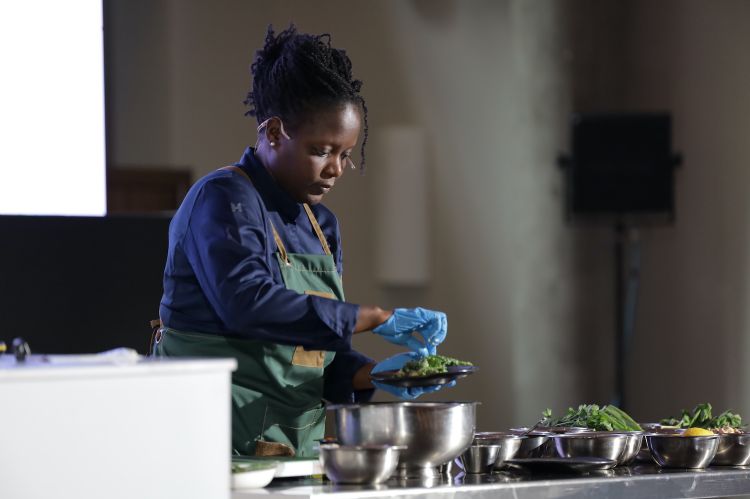
Fatmata Binta and below her dish
Among the international guests at
Féminas there was also
Fatmata Binta, chef at
Fulani Kitchen in Accra (Ghana). In her dishes she showcases the
Fulani tradition, the largest nomadic population in the world, with 20 million people.
Fatmata talked about food safety in a complicated continent like Africa, with war zones and refugees. What are you meant to do if you have to feed your extended family, fleeing a bloody civil world (in this case the one in Sierra Leone, 25 years ago)? And what do you do if your extended family includes around 300 people, what with cousins, nephews and nieces, uncles and aunts? The answer to such a concrete issue like famine, said
Fatmata, was natural: you need food. Food that can be available immediately, in large quantities and with nutrients. Hence the new value given to
fonio, a cereal similar to quinoa, high in nutrients, which grows in only 8-12 weeks.
Fatmata tells all of this while she’s making a dish with this cereal, and she also talks about the classes in which she taught women about the high nutrients in this superfood. Her pupils would whisper about the need to grow
fonio. «They whispered because women are not allowed to own the land, a right reserved only to men».
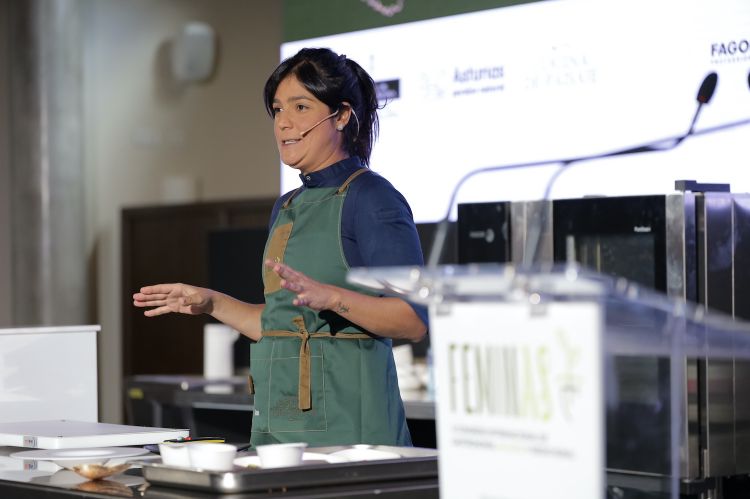
Manu Buffara and below her dish
Even Brazilian
Manoella “Manu” Buffara, chef and owner at restaurant
Manu in Curitiba, 49
th in the Latin American 50 Best, works on the food education of local community and to safeguard the right to a balanced diet. She’s one of the most prominent figures in Latin American gastronomy, actively working to recover the traditional farming systems, to promote sustainable fishing, hunting and farming techniques, to control food waste and safeguard biodiversity.
Buffara at
Féminas talked about territory, sustainability, tradition. Of the power of food and gastronomy to foster the growth of the community where you work, and of its economy; of the need to focus on education, even in terms of food. Cooking can also have an impact on women’s empowerment. Though in Latin America (like in Africa) there are countries were women cannot own the land by law, in Brazil – says
Buffara – things are changing and more and more women have moved from domestic kitchens to professional ones - in a world like gastronomy, dominated by men both in the kitchen and as food producers.
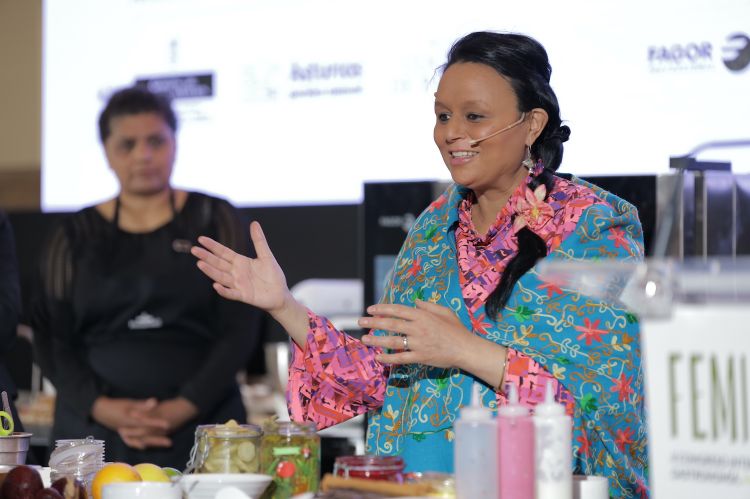
Najat Kanaache and below her dish
is instead a Spanish chef of Moroccan heritage, born in San Sebastiàn. She has travelled all around the world and earned the nickname of
cocinera itinerante, itinerating cook.
Najat, while she was preparing a magnificent dish/painting, colourful like her look on the notes of Arabian music, talked a lot of Muslim poet, gastronomist and musician
Ziryab, from the 9
th century; and she also talked about the many and deep influences of the Muslim culture on the new Andalusian cuisine, of the importance of making people aware of these influences as well as aware of the exploitation that lies behind the production of some food when you decide to eat it (this allowed to talk about the situation of paperless migrants, and of the inhumane conditions in which they are forced to live and work in the strawberry farms in the countryside of south-west Spain). In her restaurant
Nur, in the medina of Fez, an ancient and fascinating Medieval city in the north-east of Morocco,
Najat receives clients who come from all over the world to taste her dishes. Known internationally, a friend of
René Redzepi and
Ferran Adrià, when the chef visits the market in Fez, however, she must have one of her cooks with her, because women cannot go to the market by themselves: they wouldn’t be served.
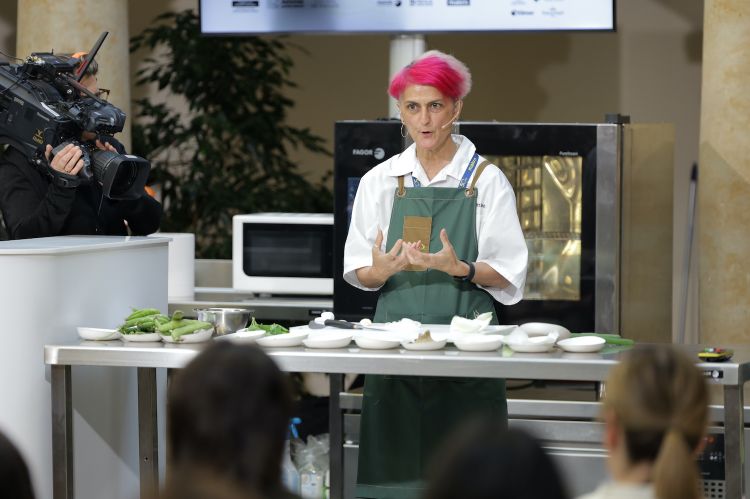
Cristina Bowerman and below her dish
So we’re back to asking ourselves, with
Bottura: is talent really enough, if then in some part of the world women can’t even buy groceries from the market? This is why congresses like
Féminas are necessary. They showcase people, talents, and voices that deserve to be on a stage, and that face important issues, pointing the spotlight on facts and issues that are changing, but are not yet fully resolved.
Cristina Bowerman, the only woman in Rome with a Michelin star with her Glass Hostaria agrees. She talked on the third and last day of the congress. «There are many female chefs, but there are still too few who receive attention and visibility, too few whose merits are acknowledged, through awards they would deserve». So it’s good to organise an event dedicated to them. Because in the end, this is the goal: not to cook succulent dishes – and indeed Cristina during her lesson was hard at work, preparing a new vegetarian take on a typical dish of Latium, called vignarola – but to awaken curiosity, raise the attention on a specific theme, provoke, analyse techniques, themes, topics, and issues in depth.
«As chefs we don’t save lives, we don’t perform open-heart surgery - Bowerman said later – But we can have an important impact in creating a change, helping the communities in which we work to grow, evolve, change». How so? By reawakening the consciences on important themes. For instance, on environmental sustainability, a commitment that last year granted Bowerman the so called "green star", as well as an invitation to the World Economic Forum in Davos.
Translated into English by Slawka G. Scarso